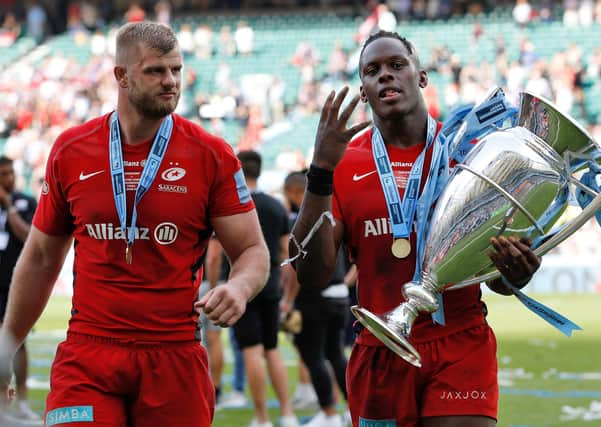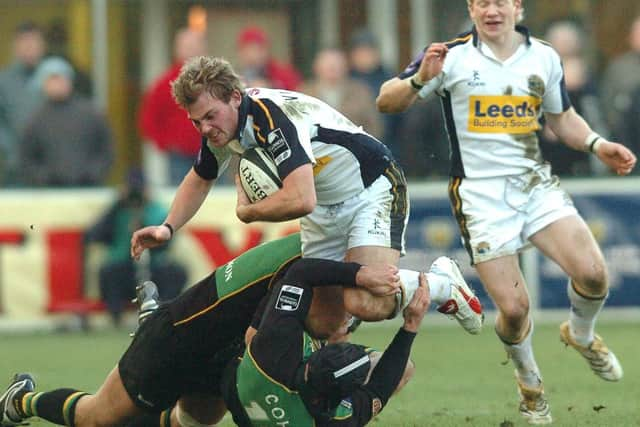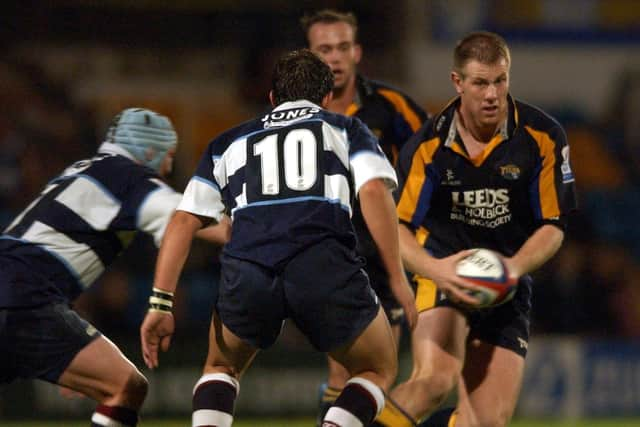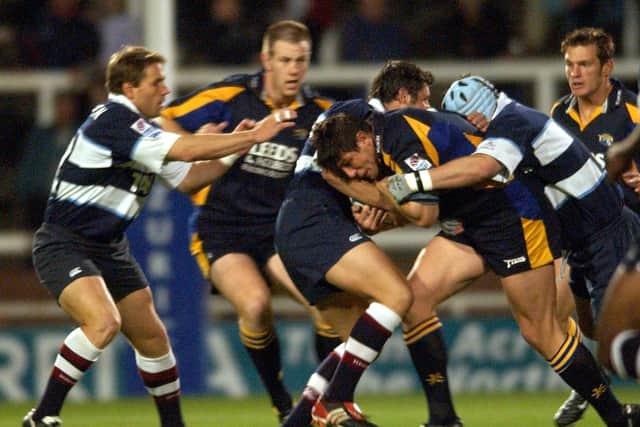Ring-fencing rugby union’s Premiership, the case for and against


The RFU council announced earlier this month that it has scrapped relegation from the Premiership this season – a bold move but, in Covid times, perhaps understandable.
However, what has caused plenty of debate is how the governing body also declared that promotion and relegation between the top division and the Championship could be put on hold for “three or four years” as it reviews the sport’s calendar.
Advertisement
Hide AdAdvertisement
Hide AdDoes relegation need scrapping for good or is movement between the two leagues still essential? Here, The Yorkshire Post sports editor Nick Westby and rugby rnion writer Dave Craven have their say.


Firstly, though former Leeds Tykes and Newcastle Falcons centre Rob Vickerman, the ex-England Sevens captain who now works as a broadcast pundit, gives his opinion.
“‘But we will never have another Exeter’ is a common argument (against relegation), citing Chiefs’ marvellous effort going from promotion in 2009 to Premiership champions in 2017,” says Vickerman.
“However, there were weaker teams in the league then, including Leeds, Worcester, London Irish and Bristol, shown by a significantly distanced top four and bottom three.
Advertisement
Hide AdAdvertisement
Hide Ad“From 2009 through to 2012 the salary cap was £4m compared to £7m (albeit now back to £5m this season).


“Since Bedford in 2000, the only club to be relegated and not return was London Welsh, who went bust a year after demotion in 2015. Ten of the last 13 relegated clubs have bounced back at the first attempt. Yet these facts aren’t the focus.
“The main argument hasn’t got anything to do with the Premiership. It’s the chasm from Premiership to Championship, not just in terms of quality but finances, stability and growing a fanbase.
“A wholly unfair parachute payment (circa £1.5m) is given to the relegated team compared to the (recently slashed) £176,000 central funding for the other teams.
Advertisement
Hide AdAdvertisement
Hide Ad“If this league was better funded, aligned with an actual purpose and partnered alongside Premiership Rugby, then ring-fencing would have less merit.”


The case AGAINST - It’s short sighted and a massive blow to the game as a whole
Dave Craven - Rugby union writer
The day in 2017 when Doncaster Knights announced they would not accept promotion to the Premiership, even if they won the Championship final, was a particularly sorry one for all who love rugby union.
To rise and rise again through the leagues, as they had, fighting tooth and nail to get to the verge of the very zenith of the game only to have to pragmatically concede it cannot actually “afford” to make the final step...


It should have rung alarm bells up and down the land.
Advertisement
Hide AdAdvertisement
Hide AdUnfortunately, the frank admission from owners Tony De Mulder and Steve Lloyd barely caused a ripple. To recall, they said: “We feel it [promotion] is simply unaffordable and out of our reach in the current structure and financial arrangement for professional rugby union in England.
“If and when the future of professional rugby union in England becomes clear, then the ambition of Doncaster Rugby Club remains as fervent as ever...”
Four years on, the future of professional rugby union here still remains distinctly opaque; everyone is still hanging on to “if” rather than “when”.
Let’s not forget, the benevolent duo are wealthy individuals who have invested millions of pounds into the South Yorkshire club over decades.
Advertisement
Hide AdAdvertisement
Hide AdBut back then, and as now, they knew it just wasn’t a level playing field for the promoted side – especially one like themselves who had no previous Premiership experience – and the financial implications for a team who would need to avoid an immediate relegation were vast.


Four years on, matters are actually worse, given RFU funding to Championship clubs has been slashed so drastically that it stands at around a tenth of the parachute payment to whomever the relegated club is.
It is no surprise more Championship clubs have turned to semi-professional status but none of this is any reason to ring-fence the Premiership and cut the second tier adrift.
The question should be how the Championship can be better funded to give clubs a more realistic chance; if action had been taken four years ago, maybe we would be there now.
Advertisement
Hide AdAdvertisement
Hide AdObviously, turkeys will never vote for Christmas and it is understandable why Premiership clubs have done their utmost to safeguard their own financial strength. Nevertheless, ring-fencing the top flight would be short sighted and a massive blow for the future of the game as a whole.
There has to be that ability to aspire for greater things, otherwise what is the point?
If promotion is off the table, the Championship will only disintegrate further and that will only be damaging to the game in the long run; it is well-documented just how many elite players and internationals have cut their teeth in the second tier.
If it is left to rot, that player pathway will disappear.
Nurture it and there can be a flourishing second tier; the sport should aim for a Premiership Two rather than cascade back towards amateurism.
Advertisement
Hide AdAdvertisement
Hide AdWith Ealing Trailfinders, Doncaster, Cornish Pirates and Coventry, there are plenty of clubs with ambition if the conditions are more helpful.
Many of them are well-set regards stadia and, although all average crowds of less than 2,000, each would rightly argue they have latent support ready to tap into given the obvious profile lift promotion would bring.
Moreover, like it or not, relegation inevitably brings drama and it is no surprise BT Sport – the broadcasters helping feed all the Premiership clubs with their fees – want to retain it.
There is talk of a three-year licence system being put in place to give aspiring Championship clubs hope of being admitted later but you need only look at Super League’s aborted attempts at that to realise it is often beset with its own issues.
Advertisement
Hide AdAdvertisement
Hide AdIf it ever came in with the Premiership, it would probably just mean the fence got taller.
In a year where it looks like the British Lions might end up playing in Britain, promotion and relegation is one tradition the game can ill-afford to lose.
The case FOR - Promotion and relegation no longer a viable proposition
Nick Westby - Sports editor
Part of me feels bad for suggesting this given I have covered Rotherham Titans, Leeds and Doncaster Knights at various junctures over the last 18 years, but the time has come to end any hopes they had of joining the Premiership.
Advertisement
Hide AdAdvertisement
Hide AdNone of those three has the resources, infrastructure or the financial or supporter backing to be a Premiership club.
If they had, they would have found it by now. They’ve had long enough, and in the case of Rotherham and Leeds, enough chances.
Doncaster have developed an infrastructure over time and have positioned themselves as the county’s standard-bearer, but in 2017 a year after getting to the Championship promotion final, they declared they would not be in a position to take their place in the Premiership had they won through a semi-final then a final.
Beyond these borders, the Championship has been operating as a semi-professional league for years, the only consistent professional element being the teams that come down from the Premiership and usually stay for a season.
Advertisement
Hide AdAdvertisement
Hide AdEaling Trailfinders are throwing money at it at the minute, Cornish Pirates have a case to be made, but otherwise, the second tier consists largely of clubs paying players as little as £15,000 a year – neither party can claim that is professional.
Through recent history, when there are clubs that break the pattern of relegated teams bouncing straight back up, there are as many tales of woe as there are those of hope.
London Welsh went up in 2012 and then went bust trying to get back there after going straight back down.
Leeds Tykes were established in the top flight for a long time but once they lost their footing, save for one season when they survived and then aimed too high, they yo-yoed between the divisions and nearly went to the wall two years ago.
Advertisement
Hide AdAdvertisement
Hide AdTheir fate is what frightens the life out of the Newcastles and Worcesters of this world; Worcester being the last team to finally get up for good in 2015 and stay there. Exeter make the strongest case in the argument for promotion and relegation, but they are the exception.
So if it’s a ring-fenced division, how will that look? How do you keep it competitive?
A strict salary cap to start with, not one easily broken by the likes of Saracens.
As it stands it is £5m, but combine that with a minimum spend of 80 per cent of that figure, and any club dropping below that faces the same sanctions as those going above it.
Advertisement
Hide AdAdvertisement
Hide AdStart with 13 clubs including Saracens and set the league for three years, giving the likes of Ealing time to build towards either joining an expanded league or replacing a perennial struggler in the Premiership.
Thirteen teams also gives the clubs two bye weeks through the regular season to rest players – crucial in an age of heightened scrutiny on player welfare.
Scrap the cup competition but expand the play-offs to eight teams, but not only that, to keep teams positioned ninth to 13th interested as long as possible, ape the model basketball’s NBA is testing this season whereby teams one through six qualify automatically, then teams seven to 10 contest a one-off play-in tournament; seventh hosts 10th, eighth hosts ninth.
The winners complete the seeding for the play-off quarter-finals to be played over two legs, first v eighth and so on.
Advertisement
Hide AdAdvertisement
Hide AdTo keep alive the hopes of players in the Championship playing in the Premiership, hold a draft every close season in which the 13th-best team gets to pick the best player in that season’s Championship, the 12th-placed team the second best and so on.
Teams don’t have to pick if they don’t want, but the Championship club is compensated for the loss of a player, the higher the draft pick the higher the fee.
It is radical, I admit, but, after looking at the two leagues for the last decade and a half, promotion and relegation no longer works and does not represent a viable financial future.
Support The Yorkshire Post and become a subscriber today. Your subscription will help us to continue to bring quality news to the people of Yorkshire. In return, you’ll see fewer ads on site, get free access to our app and receive exclusive membiers-only offers. Click HERE to subscribe.
Comment Guidelines
National World encourages reader discussion on our stories. User feedback, insights and back-and-forth exchanges add a rich layer of context to reporting. Please review our Community Guidelines before commenting.